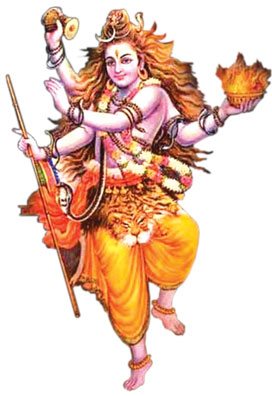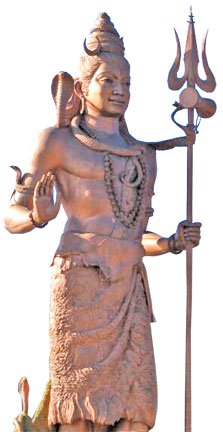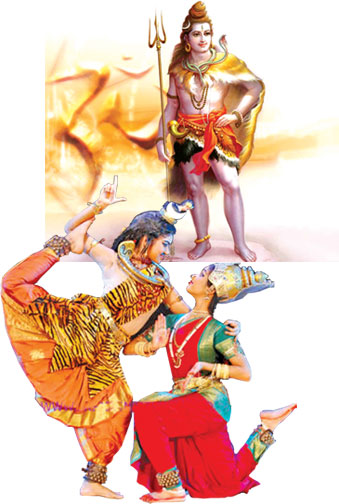|
The night of Shiva:
Significance of Maha Shivarathri
By Thulasi MUTTULINGAM
 Shivarathri, the 'Night of Shiva' falls on the second of March this
year. It is a night auspicious to Hindus all over the world, the one
night in the year when devotees stay up all night, chanting Shiva's name
(Om Namah Shivaya), or singing songs in praise of him. Shivarathri, the 'Night of Shiva' falls on the second of March this
year. It is a night auspicious to Hindus all over the world, the one
night in the year when devotees stay up all night, chanting Shiva's name
(Om Namah Shivaya), or singing songs in praise of him.
The day falls on the 13th or 14th day after the full moon, in the
month of Magha, corresponding to either February or March in the Western
calendar. It is the night before the night of the New Moon when the moon
has all but waned.
Hindus believe that this is a very powerful time of the year, when
mantras chanted or spiritual exertions undertaken are magnified
severalfold in their beneficence. So they fast all day and stay up all
night, trying to focus their minds on Shiva.There are several stories
behind why Shivarathri is so auspicious. Hinduism, having originated in
the large landmass of India, has several variants in its stories. The
several different people and races, in different areas of the country,
have variations of the story to suit their beliefs and temperaments.
So of the several stories as to how Shivarathri came to be venerated,
here are some of the more popular ones:
-It is the night of the marriage of Shiva and his consort Parvati.
-It is the night when Shiva danced his powerful Tandava dance.
-It is the night that Shiva claimed to be his favourite, when Parvati
asked him which time was most auspicious for people to pray to him.
Though Hinduism has a wide pantheon of Gods and Goddesses, the
Supreme Trinity consist of Shiva, Vishnu and Brahma.
Brahma does not enjoy widespread worship but the other two do and
depending on which deity they choose to call supreme, followers align
themselves as Saivaites (devotees of Shiva) or Vaishnavaites (devotees
of Vishnu).
And each faction has its own stories to tell about why their chosen
God is the Supreme one, and why Brahma is not worshipped.
Most Sri Lankan Hindus being Saivaites, this is their favourite
version of the Shivarathri, as told in the Shiva Purana (religious text
devoted to Shiva):
 One day, Vishnu and Brahma had an argument over which of them was the
superior deity. One day, Vishnu and Brahma had an argument over which of them was the
superior deity.
They took their dispute to Lord Shiva and asked him his opinion.
Shiva told Vishnu to find his feet and Brahma to find his head, and then
magnified himself.
Whichever of them came back successful from the quest first, was to
be the winner.
Vishnu changed himself into a wild boar and went burrowing into the
earth. Brahma changed himself into a swan and flew up into the sky.
Both of them kept going down and down and down, and up and up and up,
respectively but simply couldn't reach their destinations. Finally
Vishnu conceded defeat and came back up. Brahma however was not quite so
graceful and honest.
He too realized that he was never going to reach his destination but
was too proud to accept defeat. On his way up, he saw a Screw Pine
flower (thalampoo in Tamil) from Shiva's locks of hair, falling down.
He caught the flower and asked it to bear false witness for him; to
confirm that he had indeed attained Shiva's head and obtained the flower
from there as proof.
When he came back with this story however, Shiva the all-knower was
not pleased and cursed him as no more being worthy of worship. As for
the Screw Pine flow
er, that had borne false witness, it too was cursed to be thereafter
never used in worship.
And thus was born the Shivarathri, the night of Shiva's greatness,
when both Vishnu and Brahma spent all day and night in the search of his
'beginning' and his 'end' and couldn't do it.
Mythological stories aside, Hindus believe that this is a special
time of the year which is very portent for spiritual practices.
In the words of Indian Guru, Sri Sathya Sai Baba:
"The mind is intimately associated with the moon. Chandra, the deity
of the moon, is the presiding deity of the mind.
He loses one sixteenth of his brilliance every day after the full
moon day and continues waning until, on this night, he is left with just
one sixteenth of his power.
The waned moon may be taken to stand for the mind with all its wild
fancies and waywardness reduced after it has been conquered by spiritual
discipline.
 On this night, there is just a minute part more to be conquered, and
that can be done by keeping vigil and dwelling on the glory of God On this night, there is just a minute part more to be conquered, and
that can be done by keeping vigil and dwelling on the glory of God
The vigil that is prescribed is symbolic of the eternal vigil one has
to observe, while the rite of fasting is symbolic of divesting the
senses of the pleasures for which they crave.
The night-long devotional singing is significant of the life long
consciousness of the Divine Presence that everyone should cultivate."
Soma Swamy of Munneshwaram Temple cites this oft told story of
Shivarathri to highlight its significance:A hunter who had gone into the
forest to hunt, suddenly found himself being the hunted.
A tiger started chashing him but he managed to get up a tree first.
In his agitation, he didn't even notice that it was a Bael (Bilva)
tree, the leaves of which are sacred to Shiva or even that there was a
Shivalingam underneath the tree.
Both the tiger and the man kept up an all night vigil to see who
would tire first.
It happened to be the night of Shivarathri, which too the hunter was
unaware of.
To stave off his agitation, he unconsciously started plucking the
bilva leaves and dropping them one by one.
His canteen of water also happened to be leaky and leaked out water,
drop by drop. Since he was sitting directly above the Shivalingam, he
thus conducted an abhisekam (ritual worship) of Shiva using his
favourite leaves and water, on his most auspicious night - all without
knowing it. Merit accrued to him nevertheless and he attained great
yogic powers and became spiritually enlightened. Says Soma Swamy.
Priest of the Munneshwaram Shiva temple, "This goes to show the
benefits of worshipping on the Shivarathri.
What cannot be attained on any other night can be attained on this
night with only a little effort."
|

